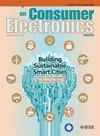RTAEI: Robust Tabular Autoencoder Interpolator to Gastric Cancer Innovative Detection for Deep Learning Empowered Healthcare Electronics
IF 4.3
2区 计算机科学
Q1 ENGINEERING, ELECTRICAL & ELECTRONIC
引用次数: 0
Abstract
The recent integration of Artificial Intelligence (AI) into smart consumer electronics and sustainable healthcare has shown promising outcomes. However, challenges persist in utilizing medical data, mainly due to its imbalance. Imbalanced data may lead to the model’s inability to adequately learn the relationship between labels and features for the minority samples, resulting in unreliable prediction outcomes. What’s more, the existing gastric cancer detection methods are invasive, costly, and not suitable for widespread use. In this paper, a deep learning algorithm with Robust Tabular AutoEncoder Interpolar (RTAEI) is designed to screening for gastric cancer patients. First, we collected questionnaire survey data and crucial biochemical indicators from patients to form our dataset, which covers dietary habits, and H pylori infection status. Second, the Robust Tabular AutoEncoder Interpolator generated tabular data to balance the dataset. This involved encoding sparse data into a dense latent space using robust variational autoencoders and generating synthetic samples through SMOTE. Third, the generated data was input into subsequent models to predict the risk of gastric cancer. Experiments show that combining RTAEI and deep learning models, the highest AUC reached 0.792, makes it a non-invasive, convenient, and rapid method for gastric cancer screening.RTAEI:基于深度学习的医疗电子产品的胃癌创新检测鲁棒表格自编码器插补器
最近,人工智能(AI)与智能消费电子产品和可持续医疗保健的整合显示出了可喜的成果。然而,在利用医疗数据方面仍然存在挑战,主要是由于其不平衡。数据不平衡可能导致模型无法充分学习少数样本的标签和特征之间的关系,从而导致预测结果不可靠。此外,现有的胃癌检测方法具有侵入性,成本高,不适合广泛应用。本文设计了一种鲁棒Tabular AutoEncoder Interpolar (RTAEI)深度学习算法,用于胃癌患者的筛查。首先,我们收集了患者的问卷调查数据和关键生化指标,形成了我们的数据集,包括饮食习惯和幽门螺杆菌感染状况。其次,鲁棒表自动编码器插值器生成表数据来平衡数据集。这包括使用鲁棒变分自编码器将稀疏数据编码到密集的潜在空间中,并通过SMOTE生成合成样本。第三,将生成的数据输入到后续的模型中,用于预测胃癌的风险。实验表明,RTAEI与深度学习模型相结合,最高AUC达到0.792,是一种无创、方便、快速的胃癌筛查方法。
本文章由计算机程序翻译,如有差异,请以英文原文为准。
求助全文
约1分钟内获得全文
求助全文
来源期刊
CiteScore
7.70
自引率
9.30%
发文量
59
审稿时长
3.3 months
期刊介绍:
The main focus for the IEEE Transactions on Consumer Electronics is the engineering and research aspects of the theory, design, construction, manufacture or end use of mass market electronics, systems, software and services for consumers.

 求助内容:
求助内容: 应助结果提醒方式:
应助结果提醒方式:


